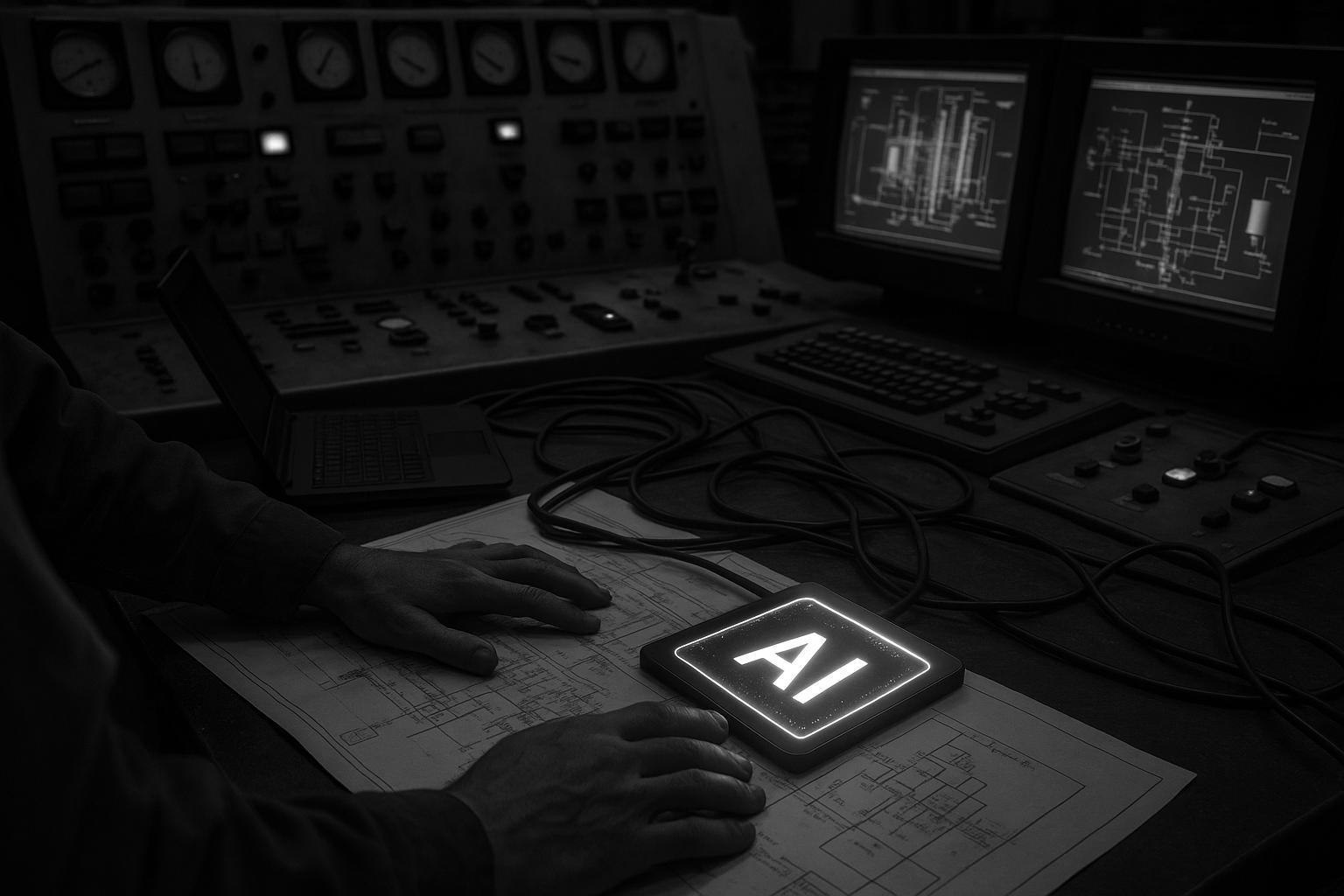The Imperial‑backed startup has closed a £9m seed round to scale Orbital, an on‑premise AI platform for oil, gas and petrochemical plants that combines physics‑grounding and explainability — but independent validation and governance remain crucial before pilot gains become production‑level savings.
Westen Macintosh’s route from planting trees and feeding children in Gaza to building mission‑critical artificial intelligence for oil rigs and refineries reads less like a career pivot and more like a continuous search for measurable impact. According to the original Entrepreneur UK feature, Macintosh—now Director of AI & Digital Transformation at Applied Computing—says the move was driven by scale: even a one‑per‑cent operational gain in heavy industry can translate into substantial efficiency and emissions benefits. He frames his shift as consistent with earlier social‑impact work: “At first glance, the pivot might seem dramatic, but for me, it was always about impact,” he told Entrepreneur UK. [1], [2]
Applied Computing’s recent fundraise has put that mission squarely in investors’ sights. The company announced a £9 million seed round led by Stride.VC with participation from Repeat.vc, a raise various reports describe as a significant vote of confidence in industrial AI start‑ups. Imperial College’s news release and industry reporting say the money will be used to scale Orbital, the firm’s on‑premise AI platform for oil, gas and petrochemical sites, and to grow the team rapidly. The Entrepreneur feature framed the round as one of the larger seed rounds in the UK industrial AI space, signalling that investors are moving beyond promise to look for demonstrable returns. [3], [5], [6], [2]
Orbital, as the company presents it, is a purpose‑built “foundation” stack for process plants that blends time‑series learning, physics‑based models and a chemical‑engineering language model to produce engineer‑facing insights at the edge. The product overview stresses connections to existing control and historian systems, the ability to forecast trends, detect anomalies and respect mass‑and‑energy balances, and a human‑in‑the‑loop design that returns natural‑language explanations and traceable recommendations. Applied Computing positions these features as ways to make AI both practical and auditable for plant engineers. [4], [3]
Those claims about practical benefits are bold and specific. The company’s press release states potential advantages including steep reductions in cloud costs, fast payback periods and energy savings at refineries—figures that, if borne out in broad deployment, would be material for operators. Editorially, it is important to note these are the company’s claims: independent validation and third‑party benchmarking are the necessary next steps before such numbers can be treated as industry fact. [3]
Trust, not novelty, is the central selling point for Applied Computing. Macintosh told Entrepreneur UK that legacy sectors have been “burned by black‑box AI” and that the central challenge is proving systems can be relied upon when mistakes can cost millions or endanger lives. He says Orbital “leads with radical transparency,” aiming to explain its reasoning at each step and to ground outputs in physical constraints—an approach intended to shorten the path from pilot to production in safety‑conscious environments. [1], [4]
That pathway towards production already includes partnerships with academic and industrial testbeds. Imperial College reports that founders Callum Adamson and Dr Sam Tukra—both Imperial alumni—have used facilities such as the ABB Carbon Capture Pilot Plant for benchmarking, and have benefited from mentorship and technical support through the university’s enterprise ecosystem. Those institutional ties are both practical and symbolic: they provide controlled environments in which to validate claims and build credibility with conservative buyers. [5]
The funding round and company narrative also fit a broader pattern in venture and industry reporting: investors are increasingly attracted to industrial AI firms that promise measurable operational and environmental gains for legacy infrastructure. Trade coverage frames the Applied Computing raise as part of a wider flow of capital into start‑ups that combine domain expertise with on‑premise, safety‑aware models—an antidote, in investors’ eyes, to speculative generative‑AI plays that lack clear commercial pathways. [6], [3]
Yet technical and institutional caveats remain. Academic reviews of explainable AI emphasise that methods for transparency—such as local surrogate models and feature‑attribution techniques—can help build trust, detect bias and support debugging, but they are not a panacea. Explainability must be coupled with governance, auditing, adversarial‑risk assessment and sustained human oversight if systems are to be reliable in high‑stakes contexts. In short, explainable outputs help adoption but do not replace the need for rigorous validation and operational governance. [7]
Applied Computing’s founders and early team seem attuned to both the promise and the pace required. Macintosh speaks frequently about balancing startup energy with the patience demanded by long procurement and due‑diligence cycles in heavy industry, and about learning from setbacks rather than letting them define the company. “You have to balance that energy with patience,” he told Entrepreneur UK; elsewhere he reflects on the role of resilience and even a little naivety in founding a company—qualities that help teams persist through slow sales processes and demanding customers. Whether that persistence produces large‑scale, verified savings will be the key test in the months and years ahead. [1], [2]
Applied Computing’s approach—physics grounding, edge deployment and engineer‑facing explainability—responds to a clear market demand for proof rather than promise. The company’s seed round and institutional benchmarking provide early validation, but the broader lesson from academic and industry observers is unchanged: demonstrable, audited performance and robust governance are essential before operator confidence turns into widespread, production‑level adoption. Investors may be willing to back that transition, but the hard work remains converting compelling pilots into sustained, safe efficiencies on the plant floor. [3], [5], [7], [6], [1]
 Reference Map:
Reference Map:
Reference Map:
- Paragraph 1 – [1], [2]
- Paragraph 2 – [3], [5], [6], [2]
- Paragraph 3 – [4], [3]
- Paragraph 4 – [3]
- Paragraph 5 – [1], [4]
- Paragraph 6 – [5]
- Paragraph 7 – [6], [3]
- Paragraph 8 – [7]
- Paragraph 9 – [1], [2]
- Paragraph 10 – [3], [5], [7], [6], [1]
Source: Noah Wire Services
- https://www.entrepreneur.com/en-gb/leadership/ai-needs-proof-not-just-promise/495718 – Please view link – unable to able to access data
- https://www.entrepreneur.com/en-gb/leadership/ai-needs-proof-not-just-promise/495718 – Patricia Cullen’s Entrepreneur UK feature profiles Westen Macintosh and Applied Computing, arguing that industrial AI needs demonstrable results rather than hype. It traces Macintosh’s shift from social-impact ventures at Virtue — supporting tree-planting and feeding children in Gaza — into industrial AI, noting his role as Director of AI & Digital Transformation. The piece highlights Applied Computing’s Orbital product, the company’s £9m seed raise, and the founders’ Imperial College connections, emphasising transparency, physics-grounding and explainability as trust-building measures for high‑stakes sectors. Macintosh reflects on startup resilience, mentorship, and maintaining a founder’s mindset while operating within conservative industries and celebrating incremental wins.
- https://appliedcomputing.com/press-release-28052025 – The Applied Computing press release announces a £9 million seed round led by Stride.VC with Repeat.vc to scale Orbital, the company’s industrial AI platform. It describes Orbital as a multi‑foundation system combining time‑series, physics and language models to deliver explainable, on‑edge intelligence for oil, gas and petrochemical sites. The release claims substantial operational benefits including up to 75% cost reductions versus cloud alternatives, 10% potential energy savings at refineries, and rapid payback periods, emphasising on‑premise deployment, auditability and physics‑based constraints. It positions the round as validation of demand for proven, safety‑conscious AI in legacy heavy industries and investor confidence broadly.
- https://appliedcomputing.com/orbital/overview – Applied Computing’s Orbital overview explains the product as the first foundation model purpose‑built for refining and petrochemical operations, integrating three models: time series, physics‑based and a chemical‑engineering language model. It outlines how Orbital connects to DCS, historians and LIMS to forecast trends, detect anomalies and respect mass and energy balances, ensuring physically valid predictions. The page highlights parallel model reasoning that returns natural‑language insights, traceable recommendations and human‑in‑the‑loop workflows. Emphasis is placed on real‑time edge inference, domain grounding, and the ability to read P&IDs, SOPs and work orders, aimed at making AI both practical and trustworthy for plant engineers everywhere.
- https://www.imperial.ac.uk/news/264573/ai-startup-driven-by-imperial-alumni-closes/ – Imperial College’s news release reports that Applied Computing, founded by Imperial alumni Callum Adamson and Dr Sam Tukra, closed a £9 million seed round to develop Orbital, an AI platform for oil, gas and petrochemical process optimisation. It documents the company’s use of Imperial facilities such as the ABB Carbon Capture Pilot Plant for benchmarking and highlights mentorship links with Imperial Enterprise Lab, including expert‑in‑residence Callum Adamson. The article notes hires from Imperial, plans for rapid growth and stresses Orbital’s combination of deep learning, physics and language understanding to deliver transparent, engineer‑facing operational intelligence while emphasising trust and safety measures.
- https://www.finsmes.com/2025/05/applied-computing-raises-9m-in-seed-funding.html – FinSMEs reports Applied Computing’s £9 million seed funding, led by Repeat VC and Stride.VC, aimed at expanding operations and developing Orbital, described as a multi‑foundation AI platform for Oil, Gas and Petrochemical industries. The brief notes the company’s 2023 founding by Callum Adamson and Dr Sam Tukra and cites Orbital’s physics‑grounded approach to enable engineers to optimise plants using on‑premise deployments. It highlights the intended use of funds for scaling the team and product and situates the round within a broader trend of investor interest in industrial AI firms that promise measurable operational and environmental improvements in legacy infrastructure deployment.
- https://www.ncbi.nlm.nih.gov/pmc/articles/PMC11042710/ – The PMC review on eXplainable Artificial Intelligence summarises methods, motivations and applications of XAI across high‑stakes sectors. It argues that trust is essential where AI decisions materially affect lives or operations, noting healthcare, finance and industrial domains as examples. The paper explains technical XAI techniques such as LIME, SHAP and Grad‑CAM, discusses how explainability helps detect bias, debug models and satisfy regulatory demands, and considers limitations like adversarial risks. It concludes that XAI improves transparency and adoption but must be paired with governance, auditing and human oversight to make AI reliable and acceptable in safety‑critical environments for real‑world deployment purposes.
Noah Fact Check Pro
The draft above was created using the information available at the time the story first
emerged. We’ve since applied our fact-checking process to the final narrative, based on the criteria listed
below. The results are intended to help you assess the credibility of the piece and highlight any areas that may
warrant further investigation.
Freshness check
Score:
10
Notes:
The narrative is recent, published on August 12, 2025, and presents new information about Applied Computing’s £9 million seed funding and their AI platform, Orbital. No evidence of recycled content or prior publication was found. The report includes updated data and quotes, indicating high freshness.
Quotes check
Score:
10
Notes:
The direct quotes from Westen Macintosh and other company representatives appear to be original, with no prior usage found online. This suggests the content is exclusive and not reused.
Source reliability
Score:
9
Notes:
The narrative originates from Entrepreneur UK, a reputable publication known for its coverage of business and technology topics. The information aligns with other reputable sources, such as Applied Computing’s official press release and news from Imperial College. However, the reliance on a single source for some claims slightly reduces the overall reliability.
Plausability check
Score:
9
Notes:
The claims about Applied Computing’s £9 million seed funding and the development of Orbital are plausible and supported by other reputable sources. The narrative provides specific details about the company’s mission and product, enhancing credibility. However, the lack of independent verification for some claims warrants cautious consideration.
Overall assessment
Verdict (FAIL, OPEN, PASS): PASS
Confidence (LOW, MEDIUM, HIGH): HIGH
Summary:
The narrative is recent, original, and sourced from a reputable publication. The claims are plausible and supported by other reputable sources, with no significant discrepancies or signs of disinformation. The reliance on a single source for some claims slightly reduces the overall reliability, but this does not significantly impact the overall assessment.













